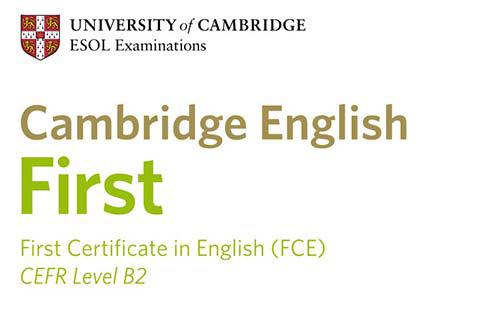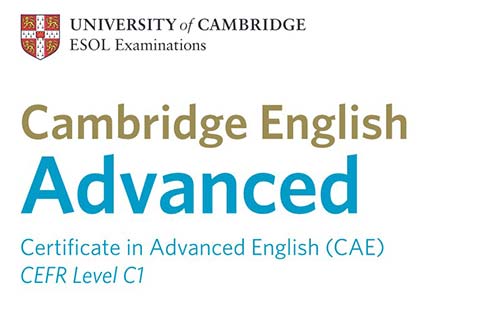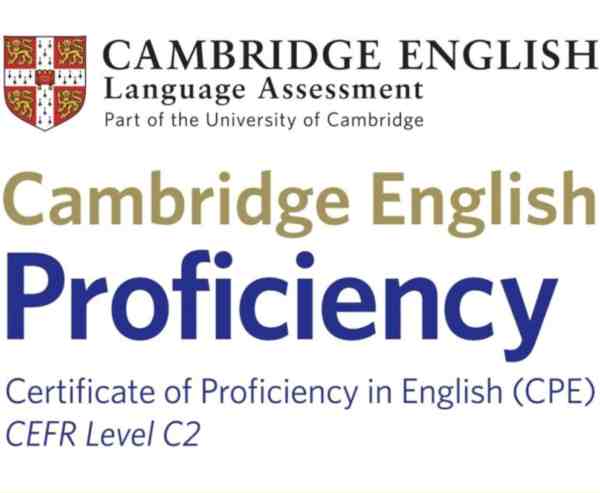Cambridge ESOL Examination Preparation Courses
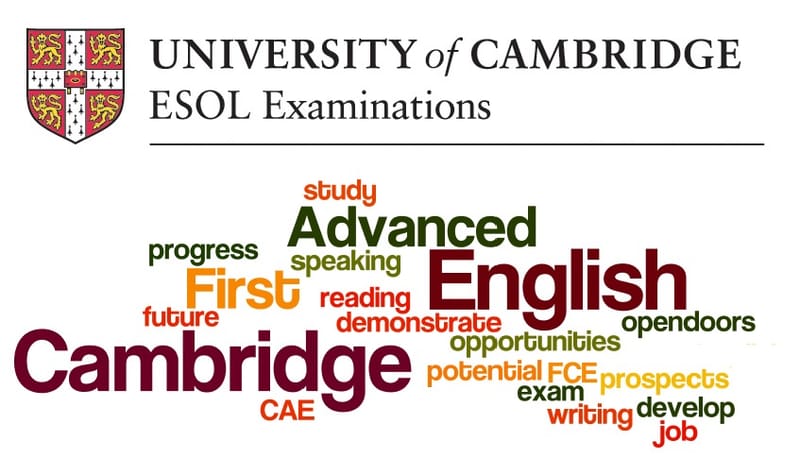
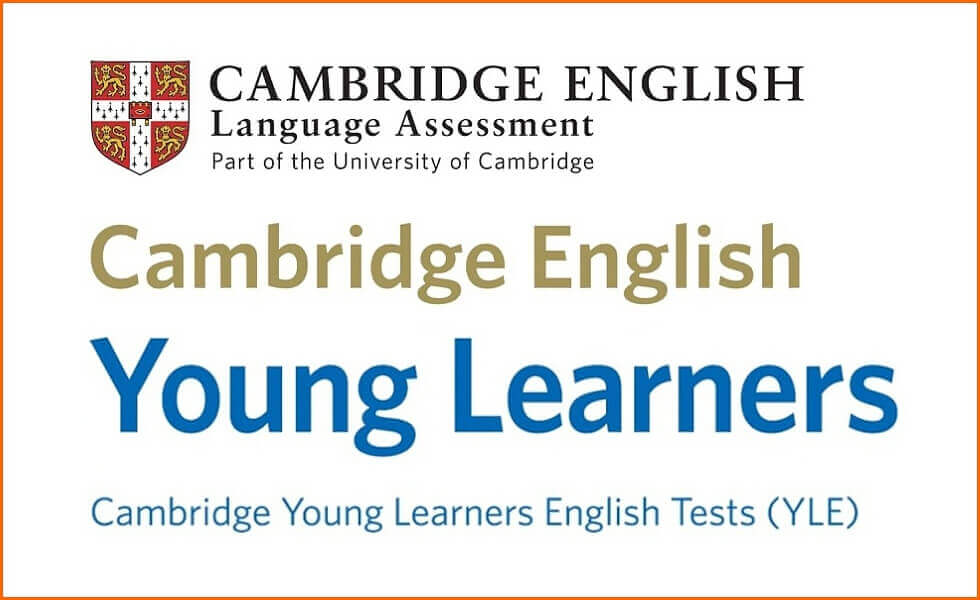

Designed to assess the English language skills of children aged between seven and twelve, the Cambridge English: Young Learners (YLE) exams are available at three assessment levels (Starters, Movers and Flyers) that encourage children to work by monitoring their progress.
Cambridge English: Starters is the first of three Cambridge English: Young Learners (YLE) tests for children between the ages of 7 and 12. This test will encourage your child to learn English from an early age and create a positive attitude to language tests.
Level of qualification: Preliminary.
Who should take the Starters exam?
Children who take the test are usually between the ages of 7 and 8, and have had about 100 hours of English lessons.
In the test your child will need to:
- recognise colours in English
- answer very simple questions about themselves
- write short one-word answers to basic questions.

Cambridge English: Movers is the second of three Cambridge English: Young Learners (YLE) tests for children between the ages of 7 and 12. This test will encourage your child to communicate in real-life situations in English and create a positive attitude to language tests.
Level of qualification: Beginner = A1 on the Common European Framework.
Who should take the Movers exam?
Children who take the test are usually between the ages of 8 and 11, and have had about 175 hours of English lessons.
In the test your child will need to:
- understand basic instructions in English
- fill out a simple form or respond to questions about themselves
- answer questions and write down simple facts (such as days of the week, times or names) they hear or read in a children’s story.

Cambridge English: Flyers is the highest of three Cambridge English: Young Learners (YLE) tests for children between the ages of 7 and 12. This test shows that your child can understand simple English in everyday situations and can communicate in basic English.
Level of qualification: Elementary = A2 on the Common European Framework.
Who should take the Flyers exam?
Children who take the test are usually between the ages of 9 and 12, and have been learning English as a second language for two to three years at school (about 250 hours of English classes). In the test your child will need to:
- explain the differences between two stories or pictures
- write or tell a short story in English
- ask questions and use the past tense. The Cambridge English: Flyers test is equivalent to the Cambridge English: Key for Schools (KETfS).
What happens when my child takes ANY of the YLE exams?
There is no pass or fail for the test. Your child can get a maximum of five shields for each part of the test. The number of shields they are awarded for each part will be shown on their certificate. They will receive their certificate about a month after taking the test.
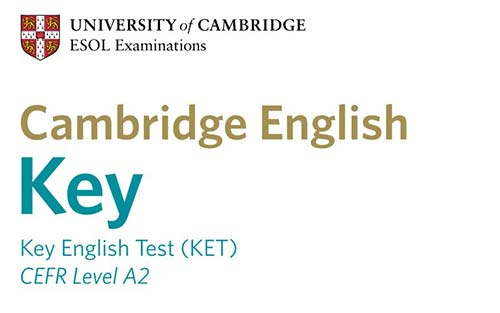
Cambridge English Qualifcations: A2 Key, also known as the Key English Test (KET), is the lowest level General English exam in the Cambridge English range. It shows that you can communicate in basic English in everyday situations.
Cambridge English: A2 Key for Schools (KETfS) is at the same level as Cambridge English: A2 Key and leads to exactly the same internationally accepted certificate. The only difference is that the exam content is targeted at the interests and experiences of schoolchildren.
Level of qualification: Elementary = A2 on the Common European Framework.
WHO SHOULD TAKE THIS EXAM?
You should take the KET if you have done about 250 hours of study or practice and can speak, write and understand basic English. This exam is the first step in building your English language skills for work or study in the future. To take the exam you should be able to:
- ask and answer questions about yourself and others
- understand announcements and instructions when people speak slowly and clearly
- tell people what you think about something you read or hear.
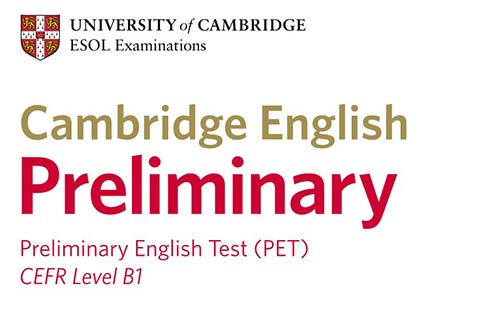
Cambridge English: Preliminary is also known as the Preliminary English Test (PET) and Preliminary English Test for Schools (PETfS). This exam shows that you can communicate in English in practical, everyday situations. It will give you a good foundation if you want to study for a professional English qualification.
Level of qualification: Intermediate = B1 on the Common European Framework.
WHO SHOULD TAKE THIS EXAM?
Studying for the PET exam will improve your English so that you can communicate when travelling or dealing with English speakers for work.
To take the exam you should be able to:
- express your likes and dislikes, and discuss them with others
- understand spoken and written announcements and instructions
- write a personal letter or take notes from a meeting or discussion.
Cambridge English: First is also called the First Certificate in English (FCE) and First Certificate in English for Schools (FCEfS). This general English qualification proves that you can speak and write English well enough to work or study in an English-speaking environment.
Level of qualification: Upper intermediate = B2 on the Common European Framework
WHO SHOULD TAKE THIS EXAM?
You should study for the FCE if you want to work in an English-speaking business, live in an English-speaking country or study a foundation-level or pre-university course taught in English.
To take the exam you should be able to:
- write short reports and emails
- explain an idea or have a detailed discussion in English
- understand general English on TV and in newspapers.
Cambridge English: Advanced is also known as the Cambridge Advanced Certificate in English (CAE). This general English qualification shows that your English is of a standard expected of a professional business person or an undergraduate university student.
Level of qualification: Advanced = C1 on the Common European Framework
WHO SHOULD TAKE THIS EXAM?
You should take CAE if you want to prove to employers or universities that you can communicate confidently in English in professional and high-level academic situations. To take the exam you should be able to:
- write complex reports and emails, and take notes in meetings or lectures
- give presentations on complicated ideas in English
- understand a variety of texts, from fiction to newspaper opinion pieces.
Cambridge English: Proficiency is also known as the Cambridge Certificate of Proficiency in English (CPE). This qualification shows that you have mastered English and can use it fluently in demanding research, academic and professional situations. This is the highest Cambridge English qualification.
Level of qualification: Proficient = C2 on the Common European Framework
WHO SHOULD TAKE THIS EXAM?
You should take the CPE if you want to prove to employers that you can use English at a senior management level, or if you want to study at postgraduate or PhD level at an English-speaking university.
To take the exam you should be able to:
- understand almost everything you hear or read in English
- use and understand formal, academic and colloquial language
- negotiate, argue and discuss the subtle issues of complex subjects.
The Teaching Knowledge Test (TKT) is a test of the skills you need to be successful in teaching English to speakers of other languages. It is suitable for teachers of all age groups and abilities. There are various test modules available.
Who should take this exam?
TKT gives you an internationally accepted qualification that proves your language-teaching abilities. The qualification is suitable if you are a new teacher and want to build your confidence and skills, or if you are an experienced teacher and want to specialise in a certain area, or are starting to teach English for the first time.
TKT is also a good foundation if you want to study for a further qualification in teaching English, such as the CELTA or Delta.
You don’t need any formal English qualifications to take the test.
What modules are available?
You can choose to take any of the TKT modules in combination or on their own.
Core modules 1-3
- TKT Module 1: Background to language teaching
- TKT Module 2: Planning for language teaching
- TKT Module 3: Classroom management
Specialist modules
- TKT Content and Language Integrated Learning (CLIL)
- TKT Young Learners (YL)
Each module consists of 80 questions and lasts 80 minutes.

